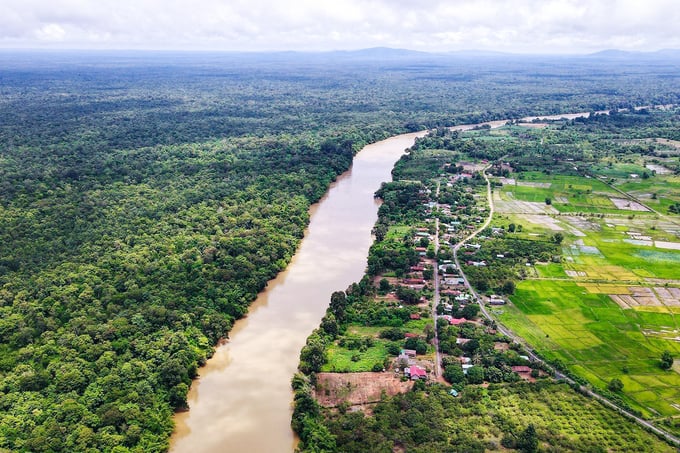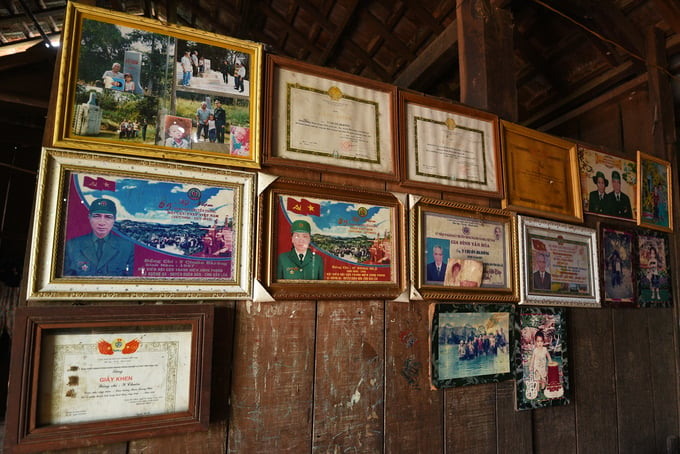May 29, 2025 | 05:28 GMT +7
May 29, 2025 | 05:28 GMT +7
Hotline: 0913.378.918
May 29, 2025 | 05:28 GMT +7
Hotline: 0913.378.918

Bird's eye view of Drang Phok village, next to the Serepok River. Photo: Tran Anh.
From the center of Krong Na commune, Buon Don district (Dak Lak), it takes about 20 kilometers to reach Drang Phok village, half of which is a trail through the typical dipterocarp forests of Yok Don National Park.
In the middle of July, the rainy season of the Central Highlands is at its peak. During our short journey, we traverse through sunny weather and stark rain.
During an hour of swaying on the nearly 20-year-old Land Cruiser, the Yok Don National Park rangers had the opportunity to share about this unique village.
“Since before the national park was established, people in Drang Phok have cultivated popular crops of the Central Highlands such as cashew, cassava, corn, rice, etc. They also join the rangers to protect the forests,” shares ranger Phan Thanh Hoa while holding on to the car’s handle.
Neatly parking the car at the cultural center, Hoa walks along the village’s main street and greets everyone, asking how they have been. It was the middle of the morning, so the elders in the village had to leave for work. After going back and forth for a while, Hoa arrived at a wooden stilt house. Outside the gate was a low fence made of B40 net and a national flag of which color has faded through time.
Hao walks up the five wooden stairs of the stilt house. He shouts inside, “Hi, dad,” while taking off his shoes. The old man inside the house, whose curly hair has turned silver and whose skin is still healthy, is wearing a red shirt with a yellow star.
Hearing Hoa’s voice, he excitedly replies: “Hello, officer.” He is Y Chuon, an old man with an authoritative voice like a village elder. Born in 1957, Y Chuon is an Ede person who follows a tradition. According to the Ede culture, men who become a father are called by their oldest son’s name to show respect. For example, Y Chuon is often called Ma Nha (“Ma” means “Father of,” and “Nha” is the name of his oldest son).
His wife, Mrs. H Roai, is three years younger than him. She is called Ami Nha, meaning Nha’s mother. The couple married in 1980; Y Nha was born after five years and became the oldest in the family.
“When we first got married, we lived in the forest. We moved here and there until finally returning to Drang Phok in 1985. On April 5, 1985, my family of four (husband, wife and two sons) with 44 other families settled down in Drang Phok,” Ma Nha recalls.

Ma Nha (red shirt) talks with the rangers of Yok Don National Park, Mr. Phan Thanh Hoa sits on the far left. Photo: Tung Dinh.
Ma Nha’s 100-meter-square stilt house is divided into two parts, marking the house’s iconic look. According to Ma Naà, he built a wooden house with a tiled roof in the beginning. Between 2014 and 2015, he expanded the house and changed the top to steel material.
In the 80s, when Mr. Chuon and Mrs. Roai had just gotten married, most people in Yok Don relied on the forest for a living. Many forage wood products and others were elephant hunters or tamers.
1980 also marked the time Ma Nha became involved in elephant hunting, specifically as an assistant for her father-in-law, a famous elephant hunter in the region.
Leaning against the pillar, the Ede man recalls: “At that time, I only followed my father-in-law’s work, so technically I wasn’t a hunter. When I gained more experience, I worked as an elephant tamer.”
Back then, the target of elephant hunters in the Central Highlands were baby elephants 4 - 5 years old. The hunters found a way to separate baby elephants from their herd, then used a braid to tie the elephants’ legs before controlling them and bringing them home.
Ma Nha says these baby elephants are tied to a large tree. As an elephant tamer, he cared for the animals while disciplining them. Elephants could take about three to six months to tame, and “stubborn” elephants could take up to a year.
“Baby elephants are susceptible, they are like children. If you want to tame them, you’d have to feed them, play with them, and bathe them. When they misbehave, you have to discipline them. But you cannot be too strict since the elephant might try suicide instead of submitting to your orders,” the retired elephant hunter added.
Following his father-in-law to hunt elephants for 15 years, Ma Nha quit his job, even before the State called to stop hunting elephants. In 1995, he applied for a job at Drang Phok Forest Enterprise. He then worked as a production team leader, specializing in rice and maize cultivation.
In 2002, Drang Phok Forest Enterprise and Ban Don Forest Enterprise merged to establish Yok Don National Park. Ma Nha returned to the park to work as a ranger. After five years of service, he transferred from Station 2 to Station 4 before applying for early leave in 2007.
Telling us the story, Ma Nha shrinks back. Distant eyes replace his warm smile. “When my wife got sick, the kids were elsewhere. No one could care for her, so I had to leave the job. My wife had gallstones, so he had to be taken to Buon Ma Thuot hospital so that doctors could examine, operate and care for her in the city,” Ma Nha shares.
Furthermore, Ma Nha’s youngest daughter also suffered from a severe illness. The family had tried many treatments and spent much effort and money, but none was effective. “My daughter was born on November 25, 1995. She was very sick but still thought for the family. When we went to work that day, she took the tranquilizer and committed suicide. It was December 17, 2007,” his voice lowers.

The stilt house's wall is hung with certificates of merit and commemorative photos of Ma Nha (Y Chuon). Photo: Tung Dinh.
To change the atmosphere, Hoa asks Ma Nha about farm work. As if understanding Hoa’s thought, Ma Nha tells the boys to hang outside and says, “Farm work is still good. The kids are staying home today because it is raining outside.”
Married for over 40 years, the couple has six children and 14 grandchildren. In their 100-meter-square house, only nine people - including three generations - live together. The rest of the family is scattered in the village.
The entire arable land and residential land of the village were formed before the Government decided to establish Yok Don National Park.
Currently, the boundary between the fields of the people and the forest is clearly marked. Local people cannot expand the area of cultivation. For example, Ma Nha’s land is limited to two hectares.
Pointing to the heads of the wild boars and gills hunted in the past, now hanging as decorations, Ma Nha says: “We don’t hunt anymore. We work in the fields while coordinating with the Drang Phok Ranger Station to protect the forest".
This coordination policy has been implemented by Yok Don National Park since 2012. Currently, contracting is done by the community, the whole village of Drang Phok, at 400,000 VND/ha/year. For example, the Ma Nha family is responsible for an area of 20 hectares, so each year they receive 8 million VND paid by the Sustainable Forestry Development Program.
Accordingly, in addition to farm work, villagers coordinate with forest rangers to patrol, protect, promote and control combustible materials in the dry season. The phase of handling flammable materials usually takes place from December this year to January next year to avoid forest fires.
Translated by Quynh Chi

(VAN) The mutual export of agrifood products between the European Union (EU) and the United Kingdom (UK) must occur again without certification, border controls or other red tape. This was agreed at the UK-EU summit.
/2025/05/22/5121-2-173645_677.jpg)
(VAN) NBSAP Tracker identifies strengths and areas for improvement in the National Biodiversity Strategy, based on each region’s priorities and capacities.

(VAN) The draft amendment to the Circular on rice export trading stipulates a periodic reporting regime for rice exporting enterprises.

(VAN) Dong Thap farmers attained an average profit margin of 64% during the summer-autumn 2024 crop (first season), while An Giang and Kien Giang farmers followed with 56% and 54%, respectively.

(VAN) As a doctoral student doing research on renewable energy and electrification at Harvard University, the author shares his musings on electricity, nature, and countryside memories.

(VAN) The decree on Extended Producer Responsibility (EPR) ensures transparent management and disbursement of support funds, avoiding the creation of a “give-and-take” mechanism.

(VAN) Hue City rigorously enforces regulations regarding marine fishing and resource exploitation, with a particular emphasis on the monitoring of fishing vessels to prevent illegal, unreported, and unregulated (IUU) fishing.